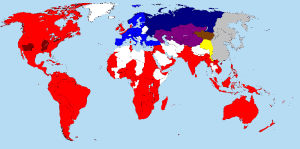
A newsletter in Church today carried a piece by a recently deceased priest on a French, Trappist monk, Charles de Foucauld, who is a candidate for beatification and the late author was one of those involved in the presentation of his cause to the Vatican. De Foucauld, an aristocrat, was a commissioned officer and saw service in Algeria where the local population failed to appreciate the benefits of French, colonial rule and frequently vented their anger on the occupying forces. The writer makes the point that the French colonialists could be fairly brutal. Last year’s terrorist attacks in Paris and the killings by young men of Algerian descent at the Charlie Hebdo office were condemned by the Western Press; few articles, at the time , made any link with the slaughter in 1961 of an estimated 300 peaceful , Algerian, nationalist demonstrators by Parisian police.
The English author notes in an aside that Britain too had an Empire – ‘although in many places it was mostly benign rule ‘. This is glaringly wrong and the kind of casual myth making which is tolerated, even in Ireland, where colonial rule saw British soldiers in recent times, adopt, with Westminster approval, a shoot-to-kill ordinance and the murder of innocent civilians , most notably in Ballymurphy and on Bloody Sunday in Derry. There are elements within the Irish establishment press that would portray the role of the British army in the Six Counties at the end of the last century, as that of a peace-keeping force. The truth, of course , is that the armed forces were active combatants.
Winston Churchill was a ruthless exponent of Empire. Many of his most brutal deeds are documented in Professor Caroline Elkins’s book, ‘Britain’s Gulag: The Brutal End of Empire’. The tactics condoned by Churchill, the Colonial Secretary, to crush aspirations for independence and freedom included the most vile methods of torture such as electric shock treatment and burning with cigarettes. Churchill saw local Kikuyu as ‘brutish children’ . That racism marked too his dealings in India and the Middle East where he regarded the Palestinians as ‘barbaric hoards’.
The known Aboriginal population of Australia at the time of white colonisation was 500 000; today it is 247 000. Scots pioneers in Victoria were often land-grabbers and squatters whose vicious ruthlessness was notorious. With the Welsh and the Irish, they played a full part in the harsh treatment of the indigenous people, including forced repatriation and the separation of children from their families.
Colonialism was a malign force which suppressed the human rights of people across the World. The English made laws which were good for their country. The Americans, for example , could not sell their tobacco rice, sugar, furs etc to any country but England. We worked in Zambia in the early seventies, a few years after independence had finally been granted. The colonial legacy was alive and thriving; copper, its most important resource, was owned and managed by Western multinationals and its value was decided, not in Lusaka, but on the London tin market. At the time of Independence, there were only five secondary schools in a country four times the size of Britain.
We have a duty to challenge fearlessly these myths about ‘benign empire’ wherever they occur. Revisionism and political apologists must not be allowed to depict the Empire in favourable terms because, in fairness to all those who suffered under it, the reverse was true.
Colonialism destroyed lives , hopes, cultures and identities; many are still living with the effects .Winston Churchill was the progenitor of modern Iraq.
The consequences are reverberating today in Aleppo.
Leave a Reply